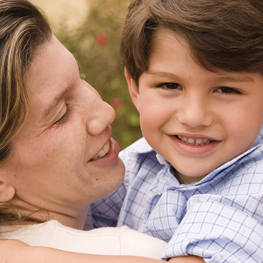
Ever struggled with a season of anxiety? You are not alone. Managing fear and stress in today’s fast-paced culture of divorce, crime, financial and natural disasters, and violence is relevant to every single one of us. In a perfect world, as parents we would cope perfectly and confidently raise our kids to feel both competent and equipped to handle the highs and lows life brings. Since we all fall short, we need to be intentional in fostering resiliency so that our children may weather storms and face challenges with courage.
Stress overview
Pediatrician Kenneth Ginsburg and the Children’s Hospital of Philadelphia (CHOP) joined forces with the American Academy of Pediatrics (AAP) to write a guide for parents and caregivers to help children better recognize their abilities and strengths.
In A Parent’s Guide to Building Resilience in Children and Teens: Giving Your Child Roots and Wings (2011) Ginsburg summarizes what we know for sure about the development of resilience in kids and provides this overview of stress:
• Children need to know that there is an adult in their life who believes in them and loves them unconditionally.
• Kids will live ‘up’ or ‘down’ to our expectations.
• We will always experience stress in our lives.
• Stress is an important tool that can aid in our survival.
• Our body’s reaction to stress is mediated through a complex interplay of sensory input - sights and sounds - as well as the brain and nervous system, hormones and the body’s cells and organs.
• Emotions play an important role in how we experience stress because the brain is the conductor of this system. The way we think about stress and what we choose to do about it can affect the impact of a stressful event.
The 7 Cs of resilience
Understanding that resilience is not a simple one-part entity, the seven Cs of resiliency include: Competence, confidence, connection, character, contribution, coping and control.
The following descriptions are followed by suggestions for strengthening resilience:
1. Competence: Competence is the ability to do something effectively or efficiently, and parents can encourage it.
• Help children focus on individual strengths.
• Focus any identified mistakes on specific incidents.
• Empower kids to make decisions.
• Be careful that the desire to protect your child doesn’t mistakenly send the message you don’t think they are competent to handle things.
• Recognize the competencies of siblings individually and avoid comparisons.
2. Confidence: A child’s belief in their own abilities is derived from competence.
• Focus on the best in each child so that they may see the best as well.
• Clearly express their best qualities, such as fairness, integrity, persistence and kindness.
• Recognize when they have done well.
• Praise honestly about specific achievements - not global praise, which lacks authenticity.
• Don’t push your child to take on more than they can realistically handle.
3. Connection: Developing close ties to family and community creates a solid sense of security that helps lead to strong values and prevents alternative destructive paths to love and attention.
• Build a sense of physical safety and emotional security within your home.
• Allow the expression of all emotions so they will feel comfortable reaching out during difficult times.
• Address conflict openly in the family to resolve problems.
• Create a common area where the family can share time (not necessarily TV time).
• Foster healthy relationships that reinforce positive messages.
4. Character: Children need to develop a solid set of morals and values to determine right from wrong and demonstrate a caring attitude toward others.
• Demonstrate how behaviors affect others.
• Help your child recognize himself or herself as a caring person.
• Demonstrate the importance of community.
• Encourage the development of spirituality.
• Avoid racist, hateful statements or stereotypes.
5. Contribution: Children need to realize that the world is a better place because they are in it. Understanding the importance of personal contribution can serve as a source of purpose and motivation.
• Communicate to children that many people in the world do not have what they need.
• Stress the importance of serving others by modeling generosity.
• Create opportunities for each child to contribute in some specific way.
6. Coping: Learning to cope effectively with stress will help your child be better prepared to overcome life’s challenges.
• Model positive coping strategies on a consistent basis.
• Guide your child to develop positive and effective coping strategies.
• Realize telling them to stop the negative behavior will not be effective.
• Understand that many risky behaviors are attempts to alleviate stress and pain in kids’ daily lives.
• Do not condemn your child for negative behaviors and, potentially, increase their sense of shame.
7. Control: Children who realize that they can control the outcomes of their decisions are more likely to realize that they have the ability to bounce back. Your child’s understanding that they can make a difference further promotes competence and confidence.
• Help your child understand life’s events are not purely random and that most things that happen are the result of another individual’s choices and actions.
• Teach them that discipline is about teaching, not punishing or controlling; use discipline to help your child understand that their actions produce certain consequences.
Michele Ranard, M.Ed., has a husband, two sons and a master’s in counseling psychology.
Calgary’s Child Magazine © 2024 Calgary’s Child